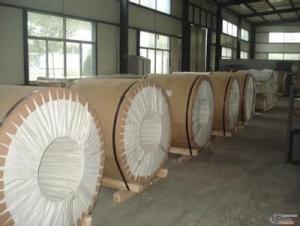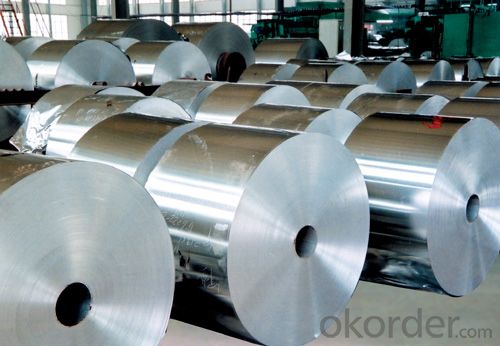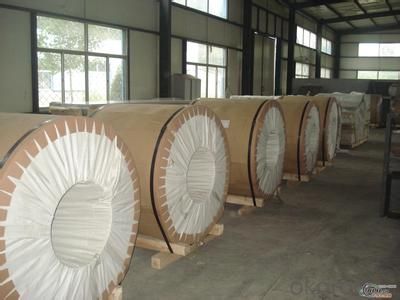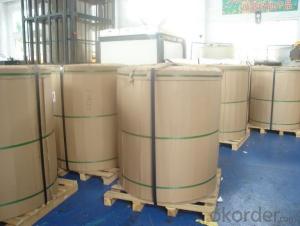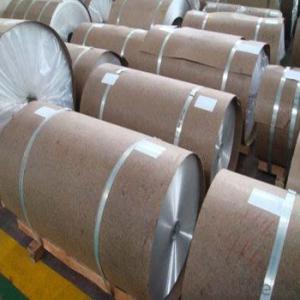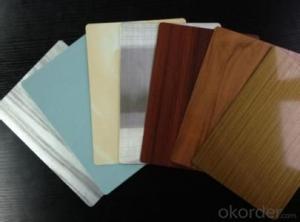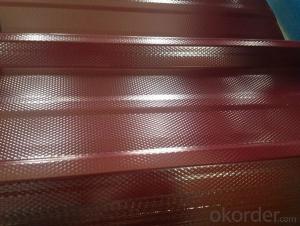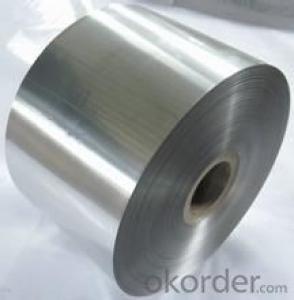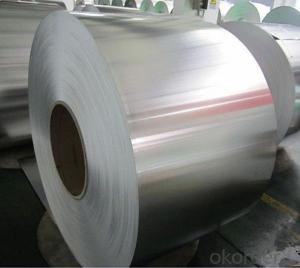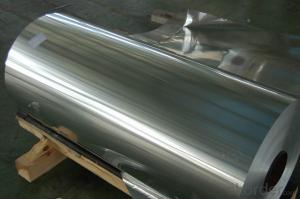Wholesale Aluminum Coil Roll - Supply Aluminum Coil Products Supplier in China
- Loading Port:
- China main port
- Payment Terms:
- TT or LC
- Min Order Qty:
- 3 m.t.
- Supply Capability:
- 17 m.t./month
OKorder Service Pledge
OKorder Financial Service
You Might Also Like
Aluminium is a relatively soft,durable, lightweight, ductile and malleablemetalwith appearance ranging from silvery to dull gray, depending on the surfaceroughness. It is nonmagnetic and does not easily ignite. A fresh film ofaluminium serves as a good reflector (approximately 92%) of visible light and an excellent reflector (asmuch as 98%) of medium and far infrared radiation. The yield strengthof pure aluminium is 7–11 MPa, while aluminium alloys have yield strengths ranging from200 MPa to 600 MPa. Aluminium has about one-third the density and stiffness of steel.It is easily machined, cast, drawn and extruded.
Aluminium alloys (or aluminum alloys; see spellingdifferences) are alloysin which aluminium(Al) is the predominant metal. The typical alloying elements are copper, magnesium,manganese,silicon,tin and zinc. There are twoprincipal classifications, namely casting alloys and wrought alloys, both of which are furthersubdivided into the categories heat-treatableand non-heat-treatable. About 85% of aluminium is used for wrought products,for example rolled plate, foils and extrusions.Cast aluminium alloys yield cost-effective products due to the low meltingpoint, although they generally have lower tensile strengthsthan wrought alloys. The most important cast aluminium alloy system is Al–Si,where the high levels of silicon (4.0–13%) contribute to give good castingcharacteristics. Aluminium alloys are widely used in engineering structures andcomponents where light weight or corrosion resistance is required
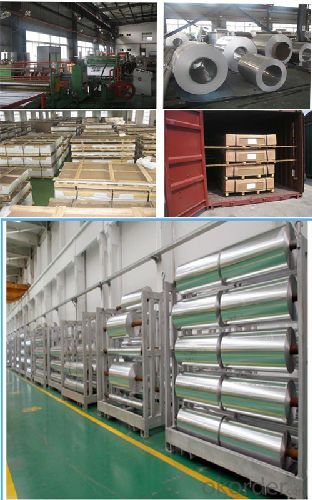
Features:
1. Excellent quality of products
2. Quick delivery
3. Best service to clients
4. BV,SGS avalible
5. No buckle o waveness
6. Tension leveling
7. Certificate of Origin
8. Form A,E
Packaging Detail: Carton ,Wooden pallet with plastic protection packing,standard seaworthy packing or as your request.
ProductionCapacity:
AnnualProduction capacity of 600,000 tons.
Products areexported to United States, Canada, U.A.E, Brazil, Mexico,Thailand, Vietnam,Nigeria etc, over 100 countries andregions all over the world.
Coveredfactories with full production line
CNBM aluminumproduction base is comprised of 18 aluminumannealers, 10 coil and foilmills, 4 continuous production lines, 2hot rolling production line and 3prepainted lines.
FAQ:
1. What is the form of payment?
Normally 30% TT, L/C
2. Type of quotation?
FOB, CFR, CIF
3. Port of loading?
Shanghai port
4. Delivery time?
30 day after client’s deposit
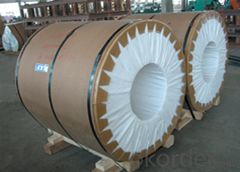
Colored aluminum sheets advantages:
The colored aluminum sheet has the advantages of both aluminum and the organic material, having both high mechanical strength of the aluminum plate, good toughness, easy processing performance advantages, but also has an organic polymer coating material is good coloring, decorative, corrosion resistance, can easily punching, bending, deep drawing, welding and other processing, products made of practical, decorative, easy processing and durable. Colored aluminum is widely used in industrial plants, railway stations, airports, stadiums, commercial buildings, homes and other buildings and manufacturing all kinds of home appliances and so on.
Colored aluminum sheet has been widely used in foreign countries, and with the continued rapid growth of China's economic construction over the past decade, Colored aluminum sheet applications and growing demand. Because of its widespread use, easy processing, long service life, light weight (specific gravity is 1/3 of iron), low unit cost, anti-fouling coatings cleaning, beautiful rich color, green and so gradually become Colored aluminum sheet industry the future direction of the market demand for larger.
- Q: Who knows the color coated aluminum roll, that is, roll coating manufacturers? Yes, let me know!
- Painted with the concept of roller you did not understand, did not know what you need.
- Q: Can aluminum coils be used in the production of aluminum siding?
- Yes, aluminum coils can be used in the production of aluminum siding. Aluminum coils are commonly used in the manufacturing process of aluminum siding due to their durability, lightweight nature, and resistance to corrosion. These coils are usually processed through a coil coating line, where the aluminum is coated with a protective layer to enhance its performance and aesthetics. The coated aluminum coils are then formed and shaped into the desired siding panels, which can be installed on residential or commercial buildings. Aluminum siding is a popular choice for its low maintenance requirements, longevity, and ability to withstand various weather conditions.
- Q: Can aluminum coils be used in chemical processing plants?
- Indeed, chemical processing plants can utilize aluminum coils. Aluminum, a versatile and extensively employed substance across multiple industries, including chemical processing, boasts exceptional resistance to corrosion. Consequently, it proves apt for the manipulation and conveyance of diverse chemicals. The application of aluminum coils extends to heat exchangers, condensers, evaporators, and other chemical processing equipment. Moreover, aluminum coils boast a lightweight nature and exhibit high thermal conductivity, promoting efficient heat transfer and energy conservation. Nevertheless, it remains crucial to carefully evaluate the specific demands and compatibility of the chemicals being processed to ascertain the suitability of aluminum coils for the intended use.
- Q: I am looking to bake some Buffalo wings and am wondering if it's alright to bake them in an aluminum pan (disposable or otherwise). I will be brushing/basting the chicken in the sauce not 'drowning' the chicken in it. I have heard that acidic sauces like Tomato sauce (less acidic than wing sauce) should not be cooked in aluminum (stovetop pans bakeware) because of some chemical interaction, but I've seen those big foil pans full of pasta spaghetti sauce at wedding, etc. Is the whole acid/aluminum thing true or an old cooking myth?
- I think it should be fine. Ive never heard that before. However aluminum conducts heat differently so it may change the end result. You might want to consider deep frying your wings. At the very least par boil them first so that you can get them crispy
- Q: What is the average lifespan of aluminum coils?
- The average lifespan of aluminum coils can vary depending on various factors such as usage, maintenance, and environmental conditions. However, with proper care and maintenance, aluminum coils can typically last for 15 to 20 years or more.
- Q: How do aluminum coils contribute to the energy efficiency of products?
- Aluminum coils play a crucial role in enhancing the energy efficiency of various products. Firstly, aluminum is known for its excellent thermal conductivity, which allows for efficient heat transfer. This characteristic enables aluminum coils to quickly and effectively transfer heat between different components within a product, such as in air conditioning systems or refrigerators. By efficiently dissipating heat, aluminum coils help these products operate more efficiently, reducing energy consumption and ultimately saving costs for consumers. Additionally, aluminum is a lightweight material, which makes it easier to incorporate into various products without adding unnecessary weight. This is particularly beneficial for industries such as automotive and aerospace, where reducing weight is essential for improving fuel efficiency. By using aluminum coils in these applications, manufacturers can achieve lighter and more energy-efficient vehicles or aircraft, resulting in reduced fuel consumption and emissions. Furthermore, aluminum coils offer excellent corrosion resistance. This is especially advantageous in products exposed to moisture or harsh environments, as it prevents rust and degradation over time. By maintaining the performance and integrity of the coils, the overall energy efficiency of the product is preserved, ensuring that it operates optimally for an extended period. In conclusion, aluminum coils contribute significantly to the energy efficiency of products through their thermal conductivity, lightweight properties, and corrosion resistance. By effectively transferring heat, reducing weight, and preventing degradation, these coils help products operate more efficiently, resulting in lower energy consumption, cost savings, and reduced environmental impact.
- Q: Is aluminium a safe metal to put in ones mouth without any side effects?
- Why wouldn't it be. You drink soda from an aluminum can, you wrap food in aluminum foil.
- Q: I HEARD THAT ALUMINUM POWDER TIGHTEN YOUR VAGINA BUT WHERE DO I BUY IT AND HAVE ANY ONE HEARD OF BEYDARY PILLS, I HEARD THEY TIGHTEN YOUR VAGINA ALSO AND WHERE CAN I BUY THEM
- try leaving it alone for awhile
- Q: What are the different coil annealing options available for aluminum coils?
- For aluminum coils, there are multiple options for coil annealing, depending on the desired outcome and requirements. 1. Full Annealing: To achieve a soft and fully recrystallized structure, the aluminum coil is heated to a specific temperature and then slowly cooled down. This process helps relieve internal stresses, improve ductility, and enhance the mechanical properties of the coil. 2. Solution Annealing: This method is primarily used for heat-treatable aluminum alloys. It involves heating the coil above the alloy's solvus temperature and then rapidly cooling it. By doing so, any alloying elements are dissolved and redistributed, resulting in a homogenous microstructure. 3. Stabilization Annealing: Certain aluminum alloys undergo stabilization annealing to enhance dimensional stability and reduce the risk of distortion during subsequent processing or usage. The coil is heated to a temperature slightly below the alloy's recrystallization temperature and then slowly cooled. 4. Stress Relief Annealing: This type of annealing is performed to relieve residual stresses that may have developed during previous manufacturing processes. By heating the coil to a specific temperature and holding it there for a certain duration, the stresses are allowed to relax. This improves the coil's formability and minimizes the risk of deformation during subsequent operations. 5. Intermediate Annealing: During the manufacturing process, intermediate annealing is used to restore the ductility and formability of the aluminum coil. The coil is heated to a temperature below the recrystallization temperature and then undergoes a controlled cooling process. This eliminates any work hardening that may have occurred during previous operations. These are just a few of the common coil annealing options available for aluminum coils. The choice of annealing method depends on factors such as the alloy composition, intended application, and desired material properties. It is advisable to consult with experts or heat treatment professionals to determine the most suitable annealing method for a particular aluminum coil.
- Q: What are the different coil handling equipment options for aluminum coils?
- There are several coil handling equipment options available for handling aluminum coils, depending on the specific requirements and preferences of the user. Some of the common options include: 1. Coil Lifters: Coil lifters are specially designed lifting devices that can safely and efficiently handle aluminum coils. They typically consist of a set of clamps or hooks that securely hold the coil and are attached to a lifting mechanism. Coil lifters can be manually operated or powered by electricity or hydraulics, providing ease of use and increased productivity. 2. Coil Tippers: Coil tippers are used to rotate or tilt aluminum coils to facilitate loading, unloading, or positioning. They are typically equipped with adjustable arms or clamps that hold the coil in place during rotation. Coil tippers can be controlled manually or using hydraulic or electric systems, allowing for precise and controlled movements. 3. Coil Cars: Coil cars are specially designed transport vehicles that are used to move aluminum coils within a manufacturing facility or between different areas. They are equipped with a platform or carriage on which the coil is placed, and can feature various mechanisms for loading, unloading, and positioning the coil. Coil cars can be manually operated or powered by electricity or hydraulics for increased efficiency. 4. Coil Turnstiles: Coil turnstiles are used to safely and efficiently store and retrieve aluminum coils in a vertical position. They typically consist of a rotating drum or spool that can hold multiple coils, allowing for easy access and retrieval. Coil turnstiles can be manually operated or powered by electricity or hydraulics, providing quick and convenient storage solutions. 5. Coil Cradles: Coil cradles are used to support and protect aluminum coils during storage or transportation. They typically consist of a sturdy frame or structure with adjustable arms or supports that securely hold the coil in place. Coil cradles can be customized to accommodate different coil sizes and weights, ensuring safe and stable handling. Overall, these coil handling equipment options provide various solutions for efficiently and safely handling aluminum coils, helping to streamline manufacturing processes and improve productivity. The choice of equipment would depend on factors such as the size and weight of the coils, the specific requirements of the operation, and the available budget.
Send your message to us
Wholesale Aluminum Coil Roll - Supply Aluminum Coil Products Supplier in China
- Loading Port:
- China main port
- Payment Terms:
- TT or LC
- Min Order Qty:
- 3 m.t.
- Supply Capability:
- 17 m.t./month
OKorder Service Pledge
OKorder Financial Service
Similar products
Hot products
Hot Searches
Related keywords

